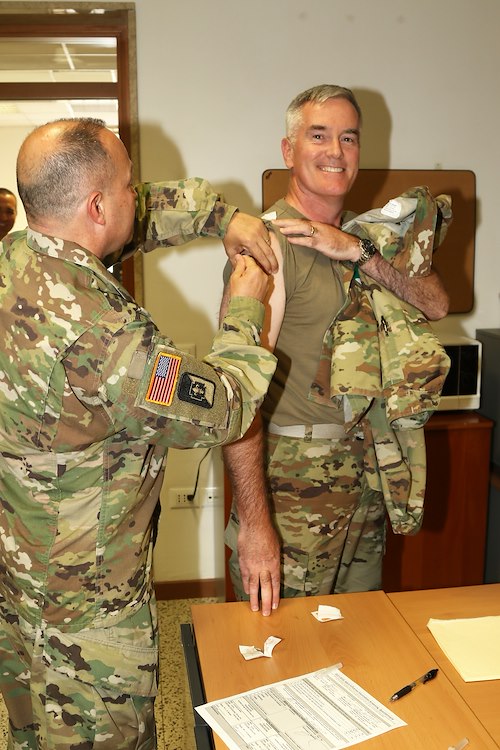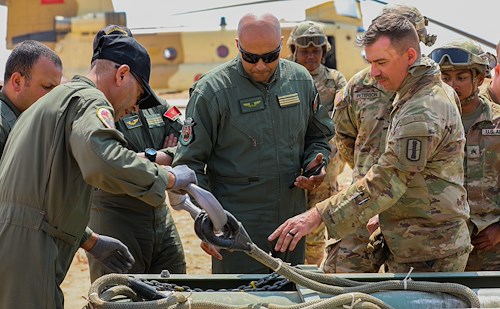Gallery contains 4 images
×
Photo 1 of 4
Prevention and Control of Seasonal Influenza
Lt. Col. Orlando Ruiz Sosa, Vicenza Army Health Clinic chief of preventive medicine and Army public health nursing, administers the annual flu shot to Col. Marvin Emerson, U.S. Army Africa deputy command surgeon, Oct. 4, 2017. Flu vaccines will be available to all authorized Vicenza community members at the Immunization Clinic, located at the Vicenza Army Health Clinic, Bldg. 2310, first floor, on a walk-in basis.
Photo by: Maj. Ruben I. Ortiz, USARAF Environmental Science Officer
Photo 2 of 4
Prevention and Control of Seasonal Influenza
Lt. Col. Orlando Ruiz Sosa, Vicenza Army Health Clinic chief of preventive medicine and Army public health nursing, administers the annual flu shot to Capt. Tim Jennings, U.S. Army Africa commanding general aide-de-camp, Oct. 4, 2017. Flu vaccines will be available to all authorized Vicenza community members at the Immunization Clinic, located at the Vicenza Army Health Clinic, Bldg. 2310, first floor, on a walk-in basis.
Photo by: Maj. Ruben I. Ortiz, USARAF Environmental Science Officer
Photo 3 of 4
Prevention and Control of Seasonal Influenza
Lt. Col. Orlando Ruiz Sosa, Vicenza Army Health Clinic chief of preventive medicine and Army public health nursing, administers the annual flu shot to Brig. Gen. Eugene LeBeouf, U.S. Army Africa acting commanding general, Oct. 4, 2017. Flu vaccines will be available to all authorized Vicenza community members at the Immunization Clinic, located at the Vicenza Army Health Clinic, Bldg. 2310, first floor, on a walk-in basis.
Photo by: Maj. Ruben I. Ortiz, USARAF Environmental Science Officer
Photo 4 of 4
Prevention and Control of Seasonal Influenza
Lt. Col. Orlando Ruiz Sosa, Vicenza Army Health Clinic chief of preventive medicine and Army public health nursing, administers the annual flu shot to Command Sgt. Maj. Jeremiah Inman, U.S. Army Africa command sergeant major, Oct. 4, 2017. Flu vaccines will be available to all authorized Vicenza community members at the Immunization Clinic, located at the Vicenza Army Health Clinic, Bldg. 2310, first floor, on a walk-in basis.
Photo by: Maj. Ruben I. Ortiz, USARAF Environmental Science Officer
Influenza, commonly known as the flu, is a contagious respiratory illness caused by influenza viruses that infect the nose, throat, and lungs. It can cause mild to severe illness, and at times can lead to death.
The best way to prevent the flu is by getting a flu vaccine each year.
Influenza viruses typically circulate widely in the U.S. annually, from the late fall through the early spring. Although most persons with the flu will recover without serious aftereffects, influenza can cause serious illness and death particularly among older adults, very young children, pregnant women and those with certain chronic medical conditions.
Signs and Symptoms of the Flu
People who have the flu often feel some or all of these signs and symptoms:
-
Fever* or feeling feverish/chills
-
Cough
-
Sore throat
-
Runny or stuffy nose
-
Muscle or body aches
-
Headaches
-
Fatigue (very tired)
-
Some people may have vomiting and diarrhea, though this is more common in children than adults.
*It’s important to note that not everyone with the flu will have a fever.
How the Flu Spreads
Most experts believe that influenza viruses spread mainly by droplets made when people with the flu cough, sneeze or talk. These droplets can land in the mouths or noses of people who are nearby. Less often a person might also get the flu by touching a surface or object that has influenza virus on it and then touching their own mouth, eyes or possibly their nose.
Period of Contagiousness
You may be able to pass on the flu to someone else before you know you are sick as well as while you are exhibiting symptoms. Most healthy adults may be able to infect others beginning one day before symptoms develop and up to 5-7 days after becoming sick. Some people, especially young children and people with weakened immune systems, might be able to infect others for an even longer time.
Onset of Symptoms
The time from when a person is exposed to the influenza virus to when symptoms begin is about 1 to 4 days – with an average of about 2 days.
Complications of the Flu
Complications stemming from the influenza virus can include bacterial pneumonia, ear infections, sinus infections, dehydration and worsening of chronic medical conditions such as congestive heart failure, asthma or diabetes.
People at High Risk from the Flu
Anyone can get the flu – even healthy people – and serious problems related to the flu can happen at any age, but some people are at high risk of developing serious flu-related complications if they get sick. This includes people 65 years of age and older, people of any age with certain chronic medical conditions such as asthma, diabetes or heart disease, pregnant women and young children.
Preventing the Flu
The first and most important step in preventing the flu is to get a flu vaccination each year. The Center for Disease Control and Prevention also recommends everyday preventive actions like staying away from people who are sick, covering coughs and sneezes and frequent handwashing to help slow the spread of germs that cause respiratory (nose, throat, and lungs) illnesses, like flu.
There are many reasons to get a flu vaccine each year, including these:
-
Flu vaccination can keep you from getting sick with the flu.
-
Flu vaccination can reduce the risk of flu-associated hospitalization, especially among children and older adults.
-
Flu vaccination is an important preventive medicine tool for people with chronic health conditions.
-
Vaccination helps protect women during and after pregnancy. Getting vaccinated can also protect a baby after birth from flu. Mothers pass antibodies onto the developing baby during pregnancy.
-
Flu vaccination may make your illness milder if you do get sick.
-
Getting vaccinated yourself protects people around you, including those who are more vulnerable to serious flu illness like babies, young children, older people and people with certain chronic health conditions.
Flu vaccines will be available to all authorized Vicenza community members at the Immunization Clinic, located at the Vicenza Army Health Clinic, Bldg. 2310, first floor, on a walk-in basis.
The hours for immunizations are Monday, Tuesday and Thursday - 1300-1530 and Wednesday and Friday - 0800-1100 and 1300-1530.
The immunization clinic telephone numbers are DSN: 636 – 9020 or CIV: 0444 – 61 – 9020.
Visit the CDC website for more information at https://www.cdc.gov/flu/keyfacts.htm.
















